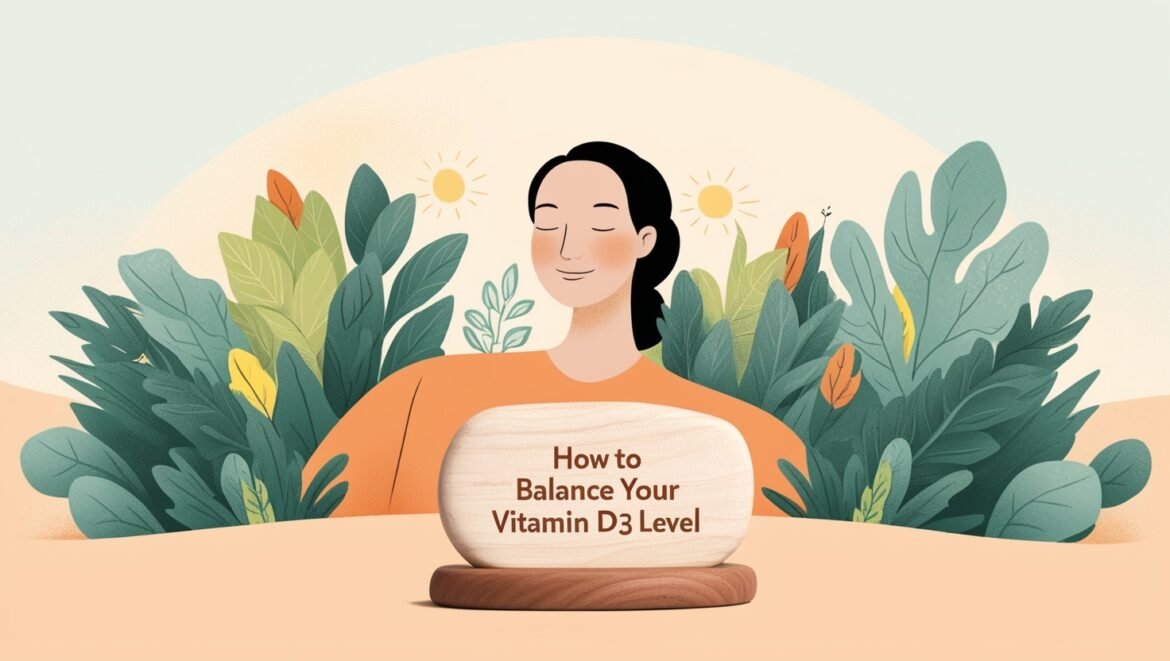So you want to balance your Vitamin D3 levels, here is the scoop. Get some sun exposure, but not too much, foods like fatty fish, egg yolks, and fortified dairy products can help. If you are low, supplements are a great option, but you should consider consulting your doctor 1st. Remember, balance is the key to a healthy you. Vitamin D3 is important for your bones, it will support your immune system. But getting the right amount of Vitamin D3 is tricky. So this article will give a simple guide on how to balance your Vitamin D3 levels to feel your best.
1. Why Vitamin D3 Matters:
Vitamin D3 helps your body use calcium from your diet, which keeps your bones and teeth healthy. It also enables your immune system to combat illness. Without enough Vitamin D3, you can feel tired, have bone pain, or get colds more often.
2. Get Sunlight:
One of the high-quality ways to get Vitamin D3 is from sunlight. When your skin is exposed to the sun, it makes Vitamin D3 naturally. Try to get outside for about 10 to 30 minutes every week. How long you need to be outside depends on your skin kind and where you stay. If you have darker skin or stay in an area with little daylight, you may want more time outside.
Tip: Short durations of sun exposure without sunscreen are pleasant for Vitamin D3 production, but make sure to apply sunscreen for longer sun exposure to protect your skin from damage.
3. Eat Foods with Vitamin D3:
You also can get Vitamin D3 from certain ingredients. Add these to your weight loss plan to help hold your level up:
- Fatty Fish: Fish like salmon, mackerel, and sardines are remarkable sources.
- Fortified Foods: Some milk, orange juice, and cereals have added Vitamin D.
- Egg Yolks and Beef Liver: These have Vitamin D3 too, even though not as lots as fish.
4. Use Supplements If Needed:
If you cannot get enough Vitamin D3 from daylight and meals, supplements can assist. They are available in pills, capsules, or liquid drops. Supplements are particularly beneficial in case you don’t get a whole lot of sun or have dietary restrictions.
Tip: Talk to your doctor before starting dietary supplements to make sure you take the proper quantity. Too much Vitamin D3 can be harmful, so it’s important to get the proper dose.
5. Check Your Levels:
It’s a great idea to have your Vitamin D3 levels checked frequently, especially in case you’re at risk of a deficiency or have fitness concerns. Your doctor can do a simple blood check to see if you have sufficient Vitamin D3 and suggest changes if wanted.
Tip: Most health professionals recommend Vitamin D3 levels between 30-60 ng/mL. Your doctor can help you understand what’s right for you.
6. Live a Healthy Lifestyle:
A healthy way of life supports good Vitamin D3 levels. Make sure to get enough sleep, manage stress, and work out frequently. All these things can help keep your Vitamin D3 levels balanced and improve your overall health.
7. Be Aware of Certain Health Conditions:
Some health issues can affect how your body absorbs Vitamin D3. For example, conditions like Crohn’s disease or celiac disease could make it tougher for your body to get the vitamins it needs. If you have any of these conditions, communicate with your doctor about how to keep your Vitamin D3 levels right.
8. Check Your Medications:
Certain medications can decrease your Vitamin D3 levels. For example, a few drugs for epilepsy and corticosteroids can affect how much Vitamin D3 you have. If you take long-term medication, ask your doctor if it impacts your Vitamin D3 levels.
Final Thoughts:
Keeping your Vitamin D3 levels balanced is important for staying healthy. You can do this by getting some sunlight, eating foods with Vitamin D3, taking supplements if needed, and checking your levels often. A balanced diet, healthy habits, and watching your health will help you keep the right Vitamin D3 levels and support your overall well-being.
